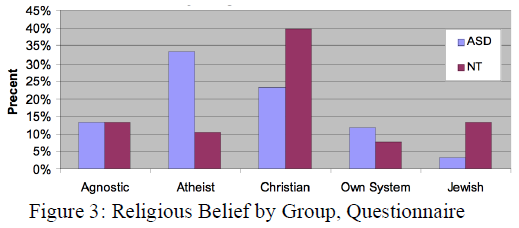A new paper on the potential links between autism and lack of god-belief has caught the attention of the blogosphere. You can read Razib’s take on it over at Gene Expression.
Prof Catherine Caldwell-Harris, the psychologist at Boston University, own wrote her own very lucid interpretation of what the results mean over at Science and Religion Today. Heck you can even read the paper itself, if you’re interested!
I’m not going to go into the study itself. Basically, they reviewed some online discussion forums, and then also ran a small questionnaire survey, and concluded that people with more symptoms of autism are also less likely to believe in god.
It is, as Caldwell-Harris acknowledges, only quite preliminary evidence. It would probably be wrong to read too much into it. And yet the result seems intuitively correct.
Why? Well, Caldwell-Harris explains that autistic people are less social, less likely to ‘mind-read’ (i.e. understand what’s going on inside other people’s heads), and are less bothered about fitting in.
Any or all of these could contribute to lower religious beliefs among autistics compared with so-called ‘neurotypicals’. Personally, I find the mind-reading ‘mentalization’ argument the most compelling.
After all, we know from neuroimaging research that when people pray they use they same parts of their brain that they use when trying to interact with real people. If autistics aren’t interested in making real friends in this way, why would they be interested in having an imaginary friend?
If it’s hard for them to see that real flesh and blood people have a mind, then it’s bound to be a darned sight harder for them to accept the idea of a disembodied, invisible mind!
But what does this tell us about atheists in general? Well, not a lot, I think. It’s not easy to get a good handle on how common autism is – a lot depends on how you define it and how thorough people are in trying to identify it. Even in the USA, which has the highest reported numbers, it’s still fewer than 1%.
And yet in the countries of Northern Europe, non-belief rates are currently hitting 50%. Given that two-thirds of the autistics in Caldwell-Harris’ sample were believers, then autism clearly is a minor factor.
This is still a fascinating piece of pychological research. Caldwell-Harris wants to do some more research into just why autistics are less interested in religion. And that research could throw an interesting perspective onto why religion is quite so popular!
 This article by Tom Rees was first published on Epiphenom. It is licensed under Creative Commons.
This article by Tom Rees was first published on Epiphenom. It is licensed under Creative Commons.














